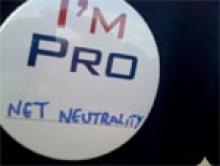Minnesota Will Stand for Network Neutrality
Update: You can watch a recording of the event here.
In anticipation of the FCC discussion on Thursday night in Minneapolis (details here), I have a short post up over at Tech.mn.
Although network neutrality can be easily distracted by partisanship, perhaps it is better viewed through the context of scale and long-term impact. Economically, for example, massive media conglomerates like Fox News, ABC and Disney (who can afford to pay ISPs to favor their content channels) could obtain crucial advantages over new and innovative startup ventures that lack both the cash and clout necessary to strike deals with ISPs.Be sure to attend the FCC Hearing if you are able. Photo used under Creative Commons license from AdamWillis.


